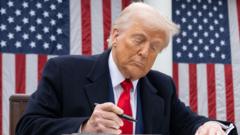As President Trump navigates international trade relations, his recent decision to postpone higher tariffs marks a significant shift. This unexpected pause provides a momentary reprieve for the stock market and hints at a complex negotiation strategy amid concerns over escalating tensions.
Trump Delays Tariffs, Easing Tensions in Global Trade Landscape

Trump Delays Tariffs, Easing Tensions in Global Trade Landscape
In a surprising turn, President Trump announces a 90-day pause on proposed tariff increases, stabilizing market fears and allowing for negotiations with multiple nations.
For days leading up to the announcement, President Donald Trump and his administration maintained a firm stance on imposing expansive "reciprocal" tariffs against various countries. Even when reports surfaced about a potential 90-day hiatus, they dismissed the news as baseless, leading to a brief upturn in stock markets. However, the pause on these tariffs has now become an official reality, delaying significant changes in the global economic order and pushing Trump's vision of enhancing American manufacturing to the back burner.
Treasury Secretary Scott Bessent confirmed that the administration received outreach from over 75 countries and anticipated more responses after this latest development. While the White House's framing of the situation suggests that the tariff pause was always part of their strategy, it is hard to overlook the investor anxiety and shifting approval ratings that may have influenced this decision.
Trump's advisers, many of whom expressed confidence in his stance, pivoted quickly to highlight the positive aspects of the suspension. Trade adviser Peter Navarro proclaimed that the situation had unfolded as intended, while press secretary Karoline Leavitt emphasized international interest in negotiations with the U.S.
Despite the announcement's clarity, confusion remained regarding which countries were affected by the tariff delays, including questions about the inclusion of the EU, Mexico, and Canada. This left many international partners scrutinizing the details posted on Trump’s Truth Social platform and trying to glean information from the administration's public statements.
During a press interaction, Trump noted the market's nervousness and acknowledged that his administration's prior confidence might have been overly optimistic. Yet, he insisted that the tariff suspension was an essential decision, attributing economic uncertainty to deeper systemic issues plaguing the U.S. economy.
Critics, particularly from the Democratic party, have expressed skepticism about Trump's leadership, with Senate Minority Leader Chuck Schumer suggesting that the president is retreating under pressure, a sentiment echoed by many analysts observing the shift in trade policy.
Regardless of the underlying strategy, the current reprieve allows the U.S. to mend relations with nations that were previously targeted by tariffs and may help stabilize the stock market. At the same time, the escalating trade war with China remains a focal point, with Trump recently imposing 125% tariffs on Chinese imports.
The complexities of the trade dynamics will continue to pose challenges as the Trump administration seeks to balance domestic economic considerations with international relations. As the 90-day pause approaches its end, the potential for renewed uncertainty lingers on the horizon, leaving both allies and adversaries awaiting the next chapter in U.S. trade policy.





















